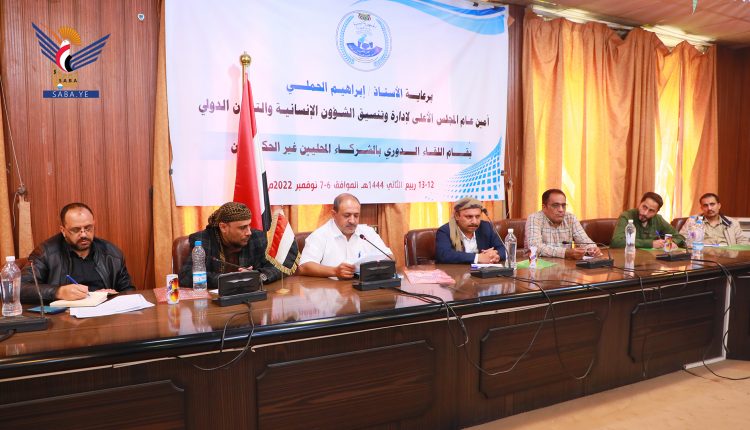SCMCHA organizes 1st meeting of non-governmental local partners
The Supreme Council for the Management and Coordination of Humanitarian Affairs (SCMCHA) on Monday organized in Sana’a the first meeting of local non-governmental partners.
The meeting discussed mechanisms of joint coordination between the council and local partners and the strengthening of cooperation in implementing humanitarian projects and activities to alleviate the suffering of the Yemeni people in light of the aggression and siege.
In the meeting, Secretary-General of the SCMCHA Ibrahim al-Hamli stressed the importance of strengthening coordination mechanisms with partners as they are one of the pillars of humanitarian, service and economic work in Yemen.
Al-Hamli pointed out that the Supreme Council sought during the last period to facilitate the procedures for registering non-governmental local partners in the Council by launching the electronic services portal and moving from the paper-based stage to electronic transactions.
He explained that the Supreme Council, represented by the General Administration of Local Organizations and Partners, will work according to its tasks and competencies to find appropriate solutions to the problems and difficulties facing the partners’ work in cooperation and coordination with all public administrations inside or outside the Council.
Al-Hamli stressed the need to improve work and provide services to the community in accordance with the highest quality standards, calling on partners to carry out their humanitarian duties, improve capabilities and performance and commit to coordinating with the Supreme Council before implementing any projects.
He urged to enhance social responsibility to face and cover any gaps through the implementation of relief work or development projects.
Meanwhile, Director General of Local Organizations and Local Partners Abdulsalam al-Nawab presented a general analysis of the obstacles facing the partners and the proposed solutions to address the existing imbalances in the coordination mechanism with the Supreme Council.
Al-Nawab touched on the procedures for completing the registration of partners in the Council and the required documents in order to facilitate the completion of the issuance of work permits.
The meeting included an open discussion by partner officials and service providers from the humanitarian partners in Yemen who pointed out the importance of the meeting to enhance communication and present different viewpoints.
They affirmed their readiness to work in accordance with the required mechanisms and standards in a way that enhances the performance of humanitarian work, expressing thanks for convening this meeting to present viewpoints.

